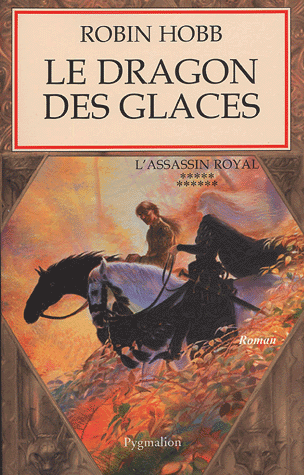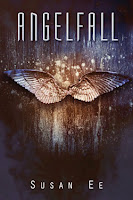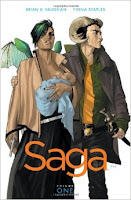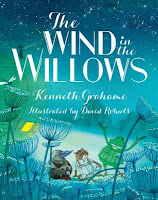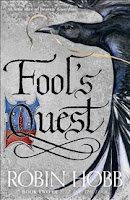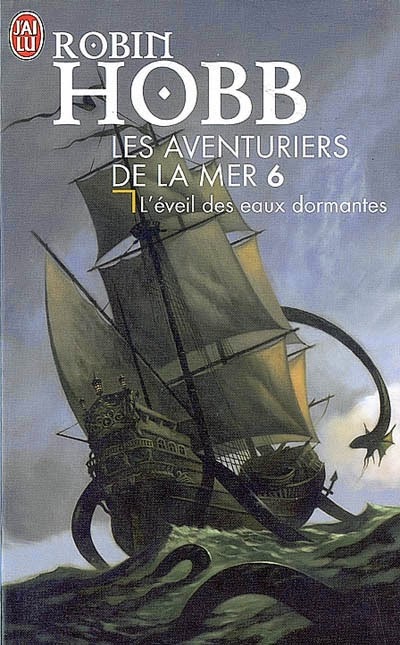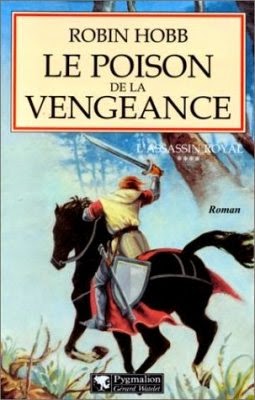
Robin Hobb
L'Assassin Royal (The Farseer Trilogy)
L'Apprenti Assassin I. (Assassin Apprentice)
L'Assassin du Roi II. (Royal Assassin)
La Nef du Crépuscule III. (Royal Assassin)
Le Poison de la Vengeance IV. (Assassin's Quest)
Le Poison de la Vengeance IV. (Assassin's Quest)
La Voie Magique V. (Assassin's Quest)
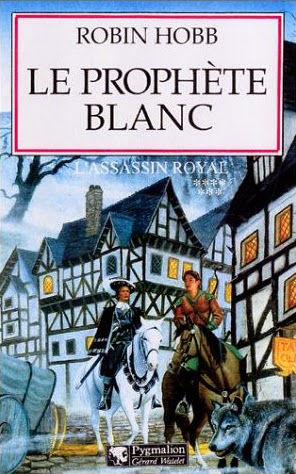
The Farseer Trilogy avait révolutionné le monde de la fantasy. Sa meilleure victoire, selon moi: ce n'était pas un choix entre la fantasy et le roman, l'aventure fantasmagorique et la profondeur de l'écriture; c'était un alliage. Qu'on retrouve ici. Une énième relecture et un gouffre d'années entre elles m'ont permis une réévaluation du premier Tawny Man livre, pas en comparaison de The Farseer Trilogy, mais en lui-même.
Hobb excelle ici en poursuivant une structure simple mais efficace, suivant son héros à travers ses pensées sombres et mélancoliques, comme ses aventures. Après un long début qui clarifie les relations entre le héros et chaque personnage, entre Fitz, ses magies, et lui-même, et qui installe l'intrigue pas à pas, l'histoire commence et le Fitz fort, charismatique et agressif qu'on aime tant revient en force. On ne retrouve pas l'excitation des intrigues politiques dans les étroits passages secrets de Castelcerf parce qu'on n'en est plus à découvrir un monde d'adulte par les yeux d'un enfant. Fitz a grandi, il fallait donc que les romans changent.
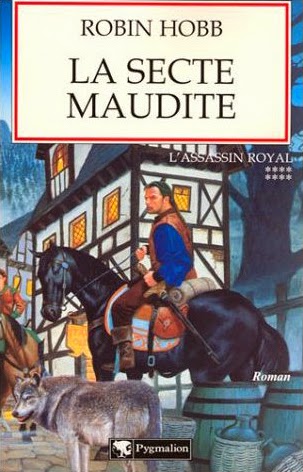
Mais tout y est. Une histoire solide, des moyens détournés mais sans extravagance pour parvenir à sa résolution, du suspense, l'installation d'intrigues futures...Bref, un roman bien tourné, qui se suffit à lui-même, tour à tour plaisant à lire et touchant. Il n'a pas tenté de me déchirer l'âme comme les romans de The Farseer Trilogy mais il m'a fait sourire, jubiler parfois, et tiré quelques larmes. Et, si les accros de fantasy noteront l'absence marquée de magie avec effets sonores et visuels, cette omission typique du style d'Hobb n'ôte rien au bouquin. Au contraire, en traitant la fantasy avec l'attention précise et posée qu'elle donne à tout, elle la renforce, la fait compter. On ne lit pas un roman de Fitz pour se divertir. On se plonge dedans.
P.S. C'est dans ce roman-ci (La Secte Maudite) que disparaît l'un des personnages principaux, alors le "quelques" dans "quelques larmes" était parce que je m'y attendais déjà...
P.S.
Évidemment, ces imbéciles d'éditeurs français avec leur obsession de
traduction rapide et de fric gâchent ce livre en le coupant en deux : le
premier volet devient une lente progression pleine de sentiments,
tandis que le second semble n'être qu'une série d'aventures. Ça change
tout au style voulu par l'auteur, je trouve, car ça rend les livres
inégaux et ça casse la fluidité de l'ambiance.
Tags: castles & châteaux, déguisements et role-playing, quête et aventures, début de tournure des relations homosociales de Fitz et le Fou, prophète blanc et catalyseur, les Autres, justesse ou non de la hiérarchie lord & vassal, mythopoeia (surtout niveau histoire et culture du vif), skill/art, wit/vif, rêves et piliers d'art, plusieurs factions politiques autour du vif, héros malmené, blurry line between animals and humans and where this line should stop,
but de la vie, la mort, la vieillesse, la nature humaine, et un peu de sagesse ici et là, Old Blood secte
Les Secrets de Castelcerf IX. (Golden Fool)
Serments et Deuils X. (Golden Fool)
Le Dragon des Glaces XI. (Fool's Fate)
L'Homme Noir XII. (Fool's Fate)
Adieux et Retrouvailles XIII. (Fool's Fate)
1995/1996/1997/2002/2003/2004
Fool's Assassin Fitz and the Fool I.
2014
This one was a little bit like the return of the prodigal son, for which we waited soooo long! And it got me to curse Robin Hobb and congratulate her in turns, leaving me unsure as to whether I liked it, or whether I got tricked into liking it. I still don't know but the way I figure, if a book leaves you both furious and on the verge of falling in love again with people and pairs who are not real, that's a good fantasy book. If a book makes you sleep less and read longer for things that overall you don't even care about, that's a good fantasy book. It means it found a way of telling a tale you did not expect, and did not care for.
Yes, while relentlessly shoving our expectations to the side, Hobb makes you care. And manages a narrow escape after a long début that can only put the reader off (no pun intended, too annoyed for that!).
Objectively, it's no page-turner. There is action but it does not lead necessarily to further action. The intrigue is a long-lasting thinly veiled 'secret': nothing is hidden, but nothing is revealed either. The reader can guess much before Fitz even wonders. Fool's Assassin feels more like a question than the first part of an answer ; a complete turn of the tide that, midway through itself, finds the power to make you wonder. The book relies on gradually building characters and plotlines so as to seek out our interest. You get so much into the 'now' of the page that you forget to ask 'what will happen next?' Past the overlong début, Hobb shows she still knows how to draw us in, even if reluctantly. It is almost as if the first 262 pages had to plunge you into a kind of lethargy to wake you to a reality you tried so hard to avoid. Yet, it works.
And all the while, it leaves you on the edge, wondering and wondering about those Fitz and Fool, turning the page only to find you've got to wonder a 'little' while longer. You close the back cover, thinking "Yes!", yet dreading the uncertainty...Exactly, I think, as this Fitz book was meant to do.
For a more detailed analysis, click here and there.
P.S. I'm rereading the Tawny Man Trilogy and, by comparison, this one is very much imbalanced in terms of structure, leaving us with a feeling of being lost in the narration (a good thing, then, that the 'now' of the page is well done): outside of the obvious, we don't know where this is leading us to. Years are spent in Withywoods, only to leave us with two or three chapters of intrigue-related action. The long long début feels like it wasn't cut at all and, actually, what of it is really necessary to the story? So, while I enjoyed the last part of the book where Bee starts to narrate, still, the whole book could have been better structured as Hobb used to do in the two previous Fitz series. It would have also given us a little more of the two main characters (Fitz is so removed from us!) instead of dwelling for ages on secondary and third characters that are new, or almost new (Riddle, Lant, Shun). As it is, there's not enough interaction with those who have always been there (Dutiful, Kettricken, ...) and who are much more rich.
Tags: ah, the turmoils of Fitzy's soul, and those of another..., mythopoeia, the idea of difference, long long going through the years... yet no saga, life of the manor and country gentry, set in a family context, mix-up of genders and sexes that won't be solved till the end, I'm sure!, wit/vif and the whole fantasy stables you expect to find, skill/art, wit/vif, life of the manor and quick coming and going into Buckkeep Castle, the big questions: no Fitz without that!,
voices in heads and bonds of personalities, moral righteousness and its diverse opposites, dreams and prophecies, action rooted in one place
Fitz and The Fool II.
2015
Perfect!
So much better than its predecessor, Fool's Quest gives us much more to work with, without choking us. Rather, it makes us chew little bits of intrigue, it makes them macerate until we’ve almost forgotten these were there, stocked in our mouth, and bang! they reappear, ready to be digested. Threads of intrigue that were long shadowed and forgotten since the first three trilogies? No, they actually come back here and are woven into the bigger intrigue, truly rounding the world of The Realm of the Elderlings again. Or, perhaps for the first time.
If Fitz’s lack of violence in the first half of the book borders on the extreme, it still manages to pass for credible and, script-wise, fulfils a purpose that will pay off in the end as it allows for other things to develop. So much happens, so many little things need to be discussed, analysed, done, that it’s a wonder Hobb could fit it all in one book. She managed, however. You'll hear of the Pirate Isles, Buckkeep Town, brawls in inns, horse rides in the deep of winter, dragons and Elderlings, a jacuzzi, stone-pillars, encampment in the wild, bears, crows, the Rain Wild, Chade's lair, poisons, axes and Verity's sword, torture, sexual violence, magic, magic, magic, the Mountain Kingdom, narwhals, prosperity and integrity, game tables, costumes and disguise, assassin's traps, plunder, Aslevjal, Skill-healings... You get the gist.
Action-packed, the book is much darker, particularly with regards to the treatment of children, perhaps an underlying result of the influence of today’s fantasy fiction. But, the violence is never too graphic or gratuitous; always in line with the scenario, always dealt with in depth.
The intrigue, the themes (particularly that of mirror), the structure of the book, the pace of the different plotlines, the characterisation, the emotions, the wise quips: everything falls into place, exactly as it had in The Farseer Trilogy, exactly as if this was Hobb’s story and not one she creates, as if she was Fitz and had merely set out in his tortured, agonising and somewhat clueless way to tell us all. She tells it perfectly. She’s truly Fitz now, as she hadn’t been in a long time; and while no reader could claim to know him better than Robin Hobb herself, it feels as if she has found him again, wit and skill and all at once.
Fitz is on board again, and while he feels a sense of failure growing in him, he’s much less a broken man, in my mind, than he was in Fool’s Assassin. He feels broken because, having stepped out of the lethargy of Withywoods, having had it wrecked, he’s actually capable of feeling again.
And not only FitzChilvary, but the Fool, Chade, Dutiful, Kettricken and all the others Farseers once more in the foreground… But, I think, the characters that to me made a lot of difference in my appreciation of this book were Motley, Ash and Per_ the first two welcome and refreshing additions to the set and clever bridges between the fool and the assassin, the last one a strong tie-in with Fool’s Assassin. Nettle is as self-satisfied and careless of others as usual and it almost feels as if her selfishness and self-centeredness was even hard on the author for the character, thank the Gods, gets progressively but surely pushed to the background, and even in some places shows signs of maturity. You'd think that at her age and in her condition, it's about time. Bee is as well developed as in the first book, so well in fact that we’re starting to feel like her protectors, caring and fearing for the child, quite like Wolf Father. And even Shun and Lant are allowed to evolve, without a complete turn that would change our first impression of their personalities. Things can still go sour with those two, the narration whispers to us...
By the last few pages, everything is in suspension, not latent as it was in Fool’s Assassin, but at a break, a tide, and if we sense what will be the predominant concerns of the next book (Bee’s fate, Fitz and the Fool’s relationship, Dutiful’s political web, the Dragons, Chade’s new found enemy…), we just don’t know how it will all go.
Beautifully written and beautifully structured, it reads like a melody dancing on hardship, action, tragedy, drama, sorrow, humour, lightness, and wisdom, without ever failing its harmony. Fool’s Quest is easily, and surprisingly, one of the best Fitz’s books.
So much better than its predecessor, Fool's Quest gives us much more to work with, without choking us. Rather, it makes us chew little bits of intrigue, it makes them macerate until we’ve almost forgotten these were there, stocked in our mouth, and bang! they reappear, ready to be digested. Threads of intrigue that were long shadowed and forgotten since the first three trilogies? No, they actually come back here and are woven into the bigger intrigue, truly rounding the world of The Realm of the Elderlings again. Or, perhaps for the first time.
If Fitz’s lack of violence in the first half of the book borders on the extreme, it still manages to pass for credible and, script-wise, fulfils a purpose that will pay off in the end as it allows for other things to develop. So much happens, so many little things need to be discussed, analysed, done, that it’s a wonder Hobb could fit it all in one book. She managed, however. You'll hear of the Pirate Isles, Buckkeep Town, brawls in inns, horse rides in the deep of winter, dragons and Elderlings, a jacuzzi, stone-pillars, encampment in the wild, bears, crows, the Rain Wild, Chade's lair, poisons, axes and Verity's sword, torture, sexual violence, magic, magic, magic, the Mountain Kingdom, narwhals, prosperity and integrity, game tables, costumes and disguise, assassin's traps, plunder, Aslevjal, Skill-healings... You get the gist.
Action-packed, the book is much darker, particularly with regards to the treatment of children, perhaps an underlying result of the influence of today’s fantasy fiction. But, the violence is never too graphic or gratuitous; always in line with the scenario, always dealt with in depth.
The intrigue, the themes (particularly that of mirror), the structure of the book, the pace of the different plotlines, the characterisation, the emotions, the wise quips: everything falls into place, exactly as it had in The Farseer Trilogy, exactly as if this was Hobb’s story and not one she creates, as if she was Fitz and had merely set out in his tortured, agonising and somewhat clueless way to tell us all. She tells it perfectly. She’s truly Fitz now, as she hadn’t been in a long time; and while no reader could claim to know him better than Robin Hobb herself, it feels as if she has found him again, wit and skill and all at once.
Fitz is on board again, and while he feels a sense of failure growing in him, he’s much less a broken man, in my mind, than he was in Fool’s Assassin. He feels broken because, having stepped out of the lethargy of Withywoods, having had it wrecked, he’s actually capable of feeling again.
And not only FitzChilvary, but the Fool, Chade, Dutiful, Kettricken and all the others Farseers once more in the foreground… But, I think, the characters that to me made a lot of difference in my appreciation of this book were Motley, Ash and Per_ the first two welcome and refreshing additions to the set and clever bridges between the fool and the assassin, the last one a strong tie-in with Fool’s Assassin. Nettle is as self-satisfied and careless of others as usual and it almost feels as if her selfishness and self-centeredness was even hard on the author for the character, thank the Gods, gets progressively but surely pushed to the background, and even in some places shows signs of maturity. You'd think that at her age and in her condition, it's about time. Bee is as well developed as in the first book, so well in fact that we’re starting to feel like her protectors, caring and fearing for the child, quite like Wolf Father. And even Shun and Lant are allowed to evolve, without a complete turn that would change our first impression of their personalities. Things can still go sour with those two, the narration whispers to us...
By the last few pages, everything is in suspension, not latent as it was in Fool’s Assassin, but at a break, a tide, and if we sense what will be the predominant concerns of the next book (Bee’s fate, Fitz and the Fool’s relationship, Dutiful’s political web, the Dragons, Chade’s new found enemy…), we just don’t know how it will all go.
Beautifully written and beautifully structured, it reads like a melody dancing on hardship, action, tragedy, drama, sorrow, humour, lightness, and wisdom, without ever failing its harmony. Fool’s Quest is easily, and surprisingly, one of the best Fitz’s books.
P.S.1 Malta!
P.S. 2 A kingly stone-dragon!
P.S. 2 A kingly stone-dragon!
voices in heads, Wolf Father and bonds of personalities, moral righteousness and its diverse opposites, dreams and prophecies, female struggle in a man's world, Verity-Dragon, Elderlings and others of a less than savoury nature, assassin's game = fool's game as Ash and Bee will serve to show, the Servants' fanaticism




